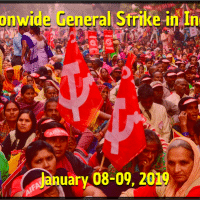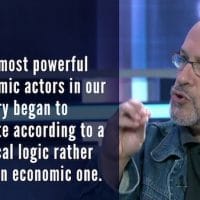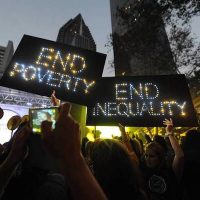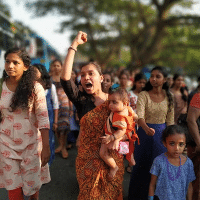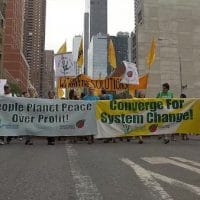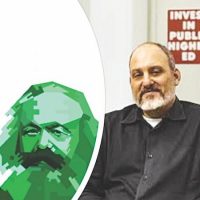-
Are we at a tipping point?
“Liberal democracy is crumbling.” A Harvard Law Professor opened a recent talk with this matter-of-fact statement and the audience readily murmured its assent.
-
Why are 200 million workers on strike in India?
The strike by 10 central trade unions is against a proposal to limit the formation and powers of trade unions, as well as for a minimum wage of Rs. 18,000 and the protection of the public sector.
-
Confronting extinction
What next for the Extinction Rebellion movement? Daniel Macmillen Voskoboynik writes that we need to shake up the economic and political systems driving the climate crisis.
-
“Activists shall not fear, we are fighting for justice” – MST’s Stedile
Landless leader told Brasil de Fato that, despite threats, MST will not back off from social struggle.
-
The roots of Karl Marx’s anti-Colonialism
Through his relationship with the Chartist radical and labor poet Ernest Jones, Karl Marx came to realize the necessity of opposing slavery and colonialism in ending capitalism.
-
How to get Venezuela’s economy going again
In this interview with Venezuelanalysis, an independent researcher speaks frankly about the roots of the country’s economic crisis and outlines a series of policies to revert it.
-
What would a Yellow Vest Movement look like in the United States?
There are many triggers that are likely to spark aggressive mass protests in 2019. Get ready.
-
Mind the gap
We’re all done singing to “days gone by” (even though no one really knows the lyrics). But, unless we change our tune and resolve to fundamentally alter the way the economy is organized, we’re going to have to face up to the problem that’s been haunting the United States for decades now: growing inequality.
-
Karl Marx on India: An assessment (Part II)
Marx correlates the decrease of Indian textile exports with the monopoly exerted by British muslins to India and the decimation of the population of Dhaka.
-
Karl Marx on India: An assessment (Part I)
In a Delhi bookshop this October, I came across Karl Marx on India. Edited by Iqbal Husain, former Professor of History at Aligarh Muslim University, and published under the aegis of Aligarh Historians Society by Tulika Books in 2006, the book attracted me too because it contained a long Introduction by the eminent Aligarh historian, Professor Irfan Habib.
-
Witches, Witch-Hunting and Women
Witches, Witch-Hunting and Women by Silvia Federici, reviewed by Jessica White.
-
How the U.S. spent Billions to change the outcome of elections around the World
The U.S. military state overthrows democratically-elected governments that it deems to be a threat to corporate interests.
-
Three years after being passed, Venezuela’s Seed Law is being implemented from below
Venezuelan grassroots organization Venezuela Libre de Transgenicos / Semillas del Pueblo (Venezuela Free from GMO / Seeds of the People) reports on the third anniversary of the passing of the Seed Law and the efforts driven from below to implement it.
-
The economic and social plan of the Bolsonaro government
“Reformed” captain Jair Bolsonaro already committed to the “market” the handover of all decisions in the economic area to large capital, under the hegemony of financial capital and foreign corporations (as personified in Paulo Guedes and his Chicago Boys, including Levy in the Brazilian Development Bank-BNDES).
-
We are sorry for the inconvenience, but this is a revolution
On January 1 in India, 5.5 million women formed a 620-kilometer wall across the length of the state of Kerala to fight for women’s rights to the Sabrimala temple. On the same day, Cuba celebrated 60 years since the 1959 revolution, which has been a persistent thorn in the side of global capital ever since.
-
Brazil’s road to neo-fascism
Pedro Rocha de Oliveira considers the context of Jair Bolsonaro’s rise to power in Brazil.
-
The art of the revolution will be internationalist
The ideological battle must be fought not only with words but also with the production of images and visuals that propel the work of movements forward.
-
Ghosts of Christmas present
Act Five for the popular Yellow Vest revolt against poverty in France came on 15 December–but it was not the finale. The movement remains vibrant and determined, especially in big southern towns such as Toulouse and Bordeaux.
-
When “green” doesn’t “grow”
The onslaught of extreme weather and the increasingly stark scientific assessment leave no doubt that we face an ecological and civilizational emergency. But in the year since COP23 in Bonn, Germany, a constant stream of headlines and reports have confirmed that governments are not on track to meet their climate commitments.
-
Living amidst the catastrophes of “the Living Contradiction”
“By its nature,” Marx writes in the climactic passage of a magnificent but very dense section of the Grundrisse, capital “posits a barrier to labor and value-creation in contradiction to its tendency to expand them boundlessly. And in as much as it both posits a barrier specific to itself, and on the other side equally drives over and beyond every barrier, it is the living contradiction.”


